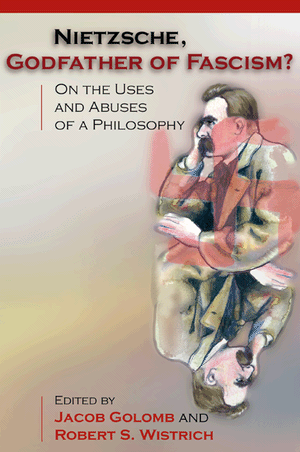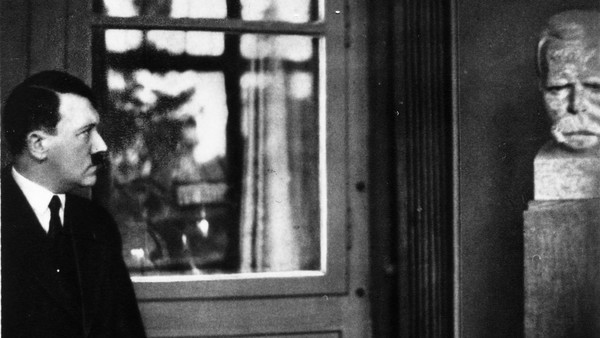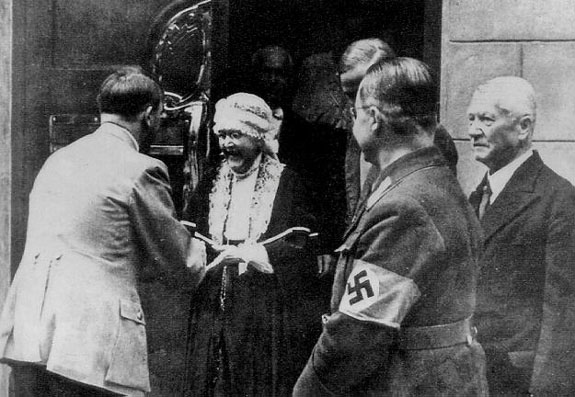
Nietzsche, Godfather of Fascism?: On the Uses & Abuses of a Philosophy
Edited by Jacob Golomb & Robert S. Wistrich
Introduction
Jacob Golomb and Robert S. Wistrich
Nietzsche and fascism? Is it not almost a contradiction in terms? What can Nietzsche have in common with this murderous ideology? The central ideal of Nietzsche's philosophy was the individual and his freedom to shape his own character and destiny. The German philosopher was frequently described as the "radical aristocrat" of the spirit because he abhorred mass culture and strove to cultivate a special kind of human being, the Übermensch, endowed with exceptional spiritual and mental qualities. What can such a thinker have in common with National Socialism's manipulation of the masses for chauvinistic goals that swallowed up the personalities, concerns, and life of the individual?
In 1934, Adolf Hitler paid a much publicized visit to the Nietzsche archives at Weimar. He had gone at the insistent request of its director, Elisabeth Förster-Nietzsche (sister of the long-deceased German philosopher), and he was accompanied by his personal photographer, Heinrich Hoffmann. The main purpose of the visit, it seems, was to enable Hoffmann to take a picture of Hitler contemplating the bust of Nietzsche, which stood in the reception room. Perhaps appropriately, only half of the philosopher's head was shown in the picture, which duly appeared in the German press with a caption that read, "The Führer before the bust of the German philosopher whose ideas have fertilized two great popular movements: the National Socialism of Germany and the Fascist movement of Italy."
Although Benito Mussolini was certainly familiar with Nietzsche's writings and was a long-time admirer of the philosopher, Hitler's own connection with Nietzsche remains uncertain. As a soldier during the First World War, he had carried the works of Schopenhauer and not those of Nietzsche in his backpack. There is no reference to Nietzsche in Mein Kampf (though there is to Schopenhauer), and in Hitler's Table Talk, he refers only indirectly to Nietzsche, saying: "In our part of the world, the Jews would have immediately eliminated Schopenhauer, Nietzsche, and Kant. If the Bolsheviks had dominion over us for two hundred years, what works of our past would be handed on to posterity? Our great men would fall into oblivion, or else they'd be presented to future generations as criminals and bandits."1
Thus the picture of Hitler gazing at Nietzsche's bust had more to do with a carefully orchestrated cult, one aspect of which was to connect National Socialism with the philosopher's legacy, at least by association. On October 1944, celebrating the hundredth anniversary of the birth of Nietzsche, Alfred Rosenberg, the leading Nazi party ideologist, delivered an official speech in Weimar, seeking to reinforce this impression: "In a truly historical sense, the National Socialist movement eclipses the rest of the world, much as Nietzsche, the individual, eclipsed the powers of his times."2 Of course, Nietzsche was not the only German philosopher invoked as a spiritual guide and forerunner of the Nazi revolution, but his "Nazification" in the course of the Third Reich is a historical fact that cannot be denied, though it is more open to interpretation than is sometimes assumed.
More of the Introduction: http://press.princeton.edu/chapters/i7403.html
PDF of Introduction: http://press.princeton.edu/chapters/i7403.pdf
I own this entire book in PDF form.--- Haven
BOOK REVIEWS
Reviewed by Peter Bergmann (Department of History, University of Florida)
Published on H-German (October, 2004)
This lively, problematic, but rewarding volume encapsulates the latest phase of Nietzsche interpretation. During the Nazi era, anti-Nietzscheanism became a convenient rallying cry for anti-fascists. Gyoergy Lukacs, in the Soviet hinterland, and Crane Brinton, in Harvard yard, summoned an anti-Hitler, anti-Nietzsche coalition whose admonition for a defeated Germany was abandon Nietzscheanism. The credibility of the "great man" explanation of Nazism (i.e. from Luther to Hitler via Nietzsche) faded as historians trooped into the archives. Intellectual history went out of fashion, and philosophers returned to either ignoring Nietzsche or depoliticizing (i.e. de-nazifying) him. The "new Nietzsche" of postwar existentialism offered refuge from the philistinism of triumphalist Stalinism or liberalism, while the Dionysian undercurrents of the 1960s opened a back door to a post-fascist Nietzsche. The shadow of the Holocaust prompted qualms, however, even in postmodern quarters. Troubled by the fact that the "only politics calling itself Nietzschean" was Nazi, Jacques Derrida warned, "one can't falsify just anything" (pp. 8, 47). The editors of Nietzsche, Godfather of Fascism?, both professors at the University of Jerusalem (one a philosopher, the other an historian), take this stricture to heart. Berel Lang's essay on Nietzsche's "responsibility" for his "misinterpretations" underscores their concern that Nietzsche not escape scot-free.
A cross-section of philosophers, historians, and Germanists along with a theologian and a political scientist bravely struggle with Nietzsche's connection to fascism. Historians have been notoriously out of their depth when faced with Nietzsche's philosophical ruminations, while philosophers have often resorted to heavy breathing and thin abstractions when obliged to consider Nietzsche's political impact. The godfather analogy allows for some indirection. A godfather can be present at the christening as a spiritual guardian or be the underworld boss unleashing the criminality of the nether world. The latter option is never seriously entertained, and the former is employed primarily as a provocation. Representative is Kurt Rudolf Fischer's argument that even if Nazism was a "Nietzschean experiment," Nietzsche functioned more as an accessory than a precursor. The jury of fifteen contributors seem to arrive at the Scotch verdict of "Not Proven." A question is raised, not resolved. Nietzsche is found neither innocent nor guilty, yet inexorably bound to the catastrophic first half of the twentieth century.
More: http://www.h-net.org/reviews/showrev.php?id=9900
The Compulsive Reader
Friedrich Nietzsche (1844-1900) is someone for whom words such as brilliant, disturbing, original, radical, and strange might have been coined. Reading his work helps one to make sense of all sorts of vague impressions and thoughts one may have been too afraid to think through. I always admired Nietzsche for his willingness to question everything; and to choose forms of culture and thought that were useful to him and his projects, something I imagine would be important to African-American thinkers and writers who have inherited various traditions, not all of which are helpful in fulfilling needs or achieving hopes. Nietzsche reminds me not only of the power philosophy has, but of the power of language: his language is one of forceful insight, of formidable style, of wit, of challenge and outrage, of nobility and spirituality. Nietzsche is very attractive; and he can be just as repellent. He was taken up during his life by French historian Hippolyte Adolphe Taine, Danish critic Georg Brandes (yes, Georg), and Swedish playwright August Strindberg, and after his death by Thomas Mann, Georges Bataille, Michel Foucault, and Cornel West—and Hitler and Mussolini. I did an independent study course on Nietzsche many years ago in college and, in my lasting admiration for his criticality and wit, I was taken aback a few years ago when I mentioned him in the midst of a friendly conversation with an Asian studies professor and she described him as a founder of fascism—I didn’t know what she was talking about, but now...
More: http://www.compulsivereader.com/2005/04 ... trich-eds/



